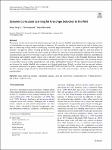Item Infomation
Full metadata record
| DC Field | Value | Language |
|---|---|---|
| dc.contributor.author | Xinyu, Yang | - |
| dc.contributor.author | Tilo, Burghardt | - |
| dc.contributor.author | Majid, Mirmehdi | - |
| dc.date.accessioned | 2023-04-25T03:18:01Z | - |
| dc.date.available | 2023-04-25T03:18:01Z | - |
| dc.date.issued | 2023 | - |
| dc.identifier.uri | https://link.springer.com/article/10.1007/s11263-023-01748-3 | - |
| dc.identifier.uri | https://dlib.phenikaa-uni.edu.vn/handle/PNK/8268 | - |
| dc.description | CC BY | vi |
| dc.description.abstract | We propose a novel end-to-end curriculum learning approach for sparsely labelled animal datasets leveraging large volumes of unlabelled data to improve supervised species detectors. We exemplify the method in detail on the task of finding great apes in camera trap footage taken in challenging real-world jungle environments. In contrast to previous semi-supervised methods, our approach adjusts learning parameters dynamically over time and gradually improves detection quality by steering training towards virtuous self-reinforcement. To achieve this, we propose integrating pseudo-labelling with curriculum learning policies and show how learning collapse can be avoided. We discuss theoretical arguments, ablations, and significant performance improvements against various state-of-the-art systems when evaluating on the Extended PanAfrican Dataset holding approx. 1.8M frames. | vi |
| dc.language.iso | en | vi |
| dc.publisher | Springer | vi |
| dc.subject | We propose a novel end-to-end curriculum learning approach for sparsely labelled animal datasets leveraging large volumes of unlabelled data to improve supervised species detectors. We exemplify the method in detail on the task of finding great apes in camera trap footage taken in challenging real-world jungle environments. In contrast to previous semi-supervised methods, our approach adjusts learning parameters dynamically over time and gradually improves detection quality by steering training towards virtuous self-reinforcement. To achieve this, we propose integrating pseudo-labelling with curriculum learning policies and show how learning collapse can be avoided. We discuss theoretical arguments, ablations, and significant performance improvements against various state-of-the-art systems when evaluating on the Extended PanAfrican Dataset holding approx. 1.8M frames. | vi |
| dc.title | Dynamic Curriculum Learning for Great Ape Detection in the Wild | vi |
| dc.type | Book | vi |
| Appears in Collections | ||
| OER - Công nghệ thông tin | ||
Files in This Item:

